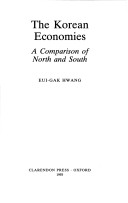This monograph sets out to analyze and to compare the parallel developments of two rival economies. North and South Korea went separate ways in 1950, ignoring common historical and economic homogeneity - one establishing autarkic socialism and the other a market-orientated capitalism. Hwang analyzes the Koreas' traditional interdependence and the economic consequences of the fratricidal war, giving a comparison of the two economies in terms of both the macroeconomic index and of living standards. Hwang considers public finance within the economies, and reveals state expenditure distribution between military and other uses. The two Koreas' external transactions has recently proven increasingly more effective than the North's self-sufficiency. The final two chapters concentrate upon economic contacts between the North and South since September 1991, when the two Koreas became regular members of the United Nations. Hwang argues that this will serve as the beginning of an era of mutual economic and political interaction, given the existing and potential comparative advantages of each, and within the context of NorthEast Asian economic co-operation.
This book provides statistical information which is an objective and consistent analysis of the respective economic performances, and useful for those studying Korea, or the economies of NorthEast Asia.
- ISBN10 0198288018
- ISBN13 9780198288015
- Publish Date January 1994
- Publish Status Out of Print
- Out of Print 12 February 1998
- Publish Country GB
- Publisher Oxford University Press
- Imprint Clarendon Press
- Format Hardcover
- Pages 420
- Language English
